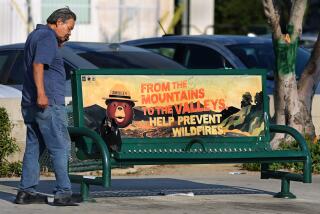Slow-news August is MIA
- Share via
Where have all the stories gone about ice cream and roller coasters and dogs versus cats?
What happened to the photo-ops of the president, doing something agrarian and looking like Jus’ Folks on his vacation (never mind that it’s a monthlong vacation)? It used to be OK to ignore politics in August.
That was the Old August, before the news kept snapping your head back.
In the New August, suicide bombers kill and maim dozens within a few hours in Baghdad and Jerusalem. The New August has massive blackouts that inconvenience tens of millions and remind everyone, including the unaffected, of the thin margins upon which “civilization” functions.
It has a spiral of dreary economic news, a lethal heat wave in Europe, a sniper on the loose in West Virginia and convulsions in Liberia. It has real politics -- the now-endless presidential campaign. California’s political circus is fun to watch -- until you’re slapped with the reality of a $38-billion budget deficit. It’s no real consolation that people are constantly “blogging” about it, either.
The combination of a more precarious world post-Sept. 11 and the advent of the 24-hour news cycle has created a greater sense of vigilance. And less ability to escape.
“When Ted Turner announced that he was starting CNN in 1980, there were a lot of skeptics,” says Jerry Nachman, editor in chief of MSNBC.
“I was in all-news radio at the time, and a few years earlier everyone said that was heretical. If you envisioned three all-news cable networks back then, I would have said that was silly. Now we’ve got that, plus all the newspapers are online all day. It’s an omnivorous maw.”
Vacations aren’t what they used to be, anyway. The modern traveler totes his BlackBerry and cellphone and laptop along with his suitcase or backpack. School tends to start earlier. Congressional business increasingly dribbles through July and bleeds into August.
It’s hard to turn it all off. Every morning, Matt Glickman, a software executive in San Francisco, clicks onto a news home page, just to see if anything big has happened since his morning newspaper was printed.
“News used to unfold more slowly,” he says. Or so it seemed.
“We used to have more people on vacation in July and August and we didn’t replace them at all,” says Jim Farley, vice president of news and programming at WTOP, an all-news radio station in Washington.
Recently, “I’ve been hiring vacation-relief people. We can’t afford to go down in staffing.... Our assumption is that the news will not take a vacation, and we’ve got to gear up for it.”
Is the president even clearing brush this summer?
“They used to call it the dog days of August,” says Dick Armey, the former House majority leader. Now, he notes, “dog days” carries connotations of something less lazy, more grueling; something to be endured rather than enjoyed.
The Old August had dumb summer movies involving various kinds of fake scary creatures that threatened to destroy people and things. The New August also has dumb scary movies. But it also has something called the Blaster worm, a real scary thing that threatens to invade everyone’s computer.
In the collective, admittedly selective, recent memory, August did seem slower.
When news broke during the month, it was often a shock, an ill-timed effrontery. When Saddam Hussein’s army invaded Kuwait in August 1990, most American news organizations were short-handed, their ranks depleted by vacationing reporters.
It was much the same in late August 1997, when Princess Diana died in a car crash in Paris.
Now? News can still shock -- the sight of bloodied children in Tuesday’s bombings did that -- but not really surprise. The nation might be at threat level yellow (elevated threat of a terrorist attack) in Department of Homeland Security parlance. But this August, certainly this last week, has had a distinctly orange feel to it.
At the very least, such a pelting of bad news can have a wearying effect, whether one is at the beach or in the office.
“With all this stuff going on, it makes ‘Gigli’ seem like reasonable escapist fare,” says Jano Cabrera, press secretary for the presidential campaign of Sen. Joe Lieberman (D-Conn.).
A depressing thought: There are no Old Augusts left. Just the new kind.
More to Read
Get the L.A. Times Politics newsletter
Deeply reported insights into legislation, politics and policy from Sacramento, Washington and beyond. In your inbox twice per week.
You may occasionally receive promotional content from the Los Angeles Times.










